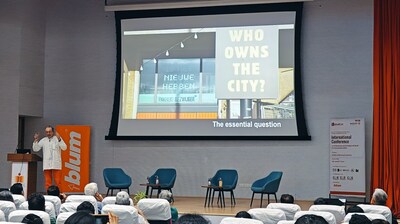HYDERABAD, India, June 12, 2024 – Building on the success of ADoBE conference held in November 2023, the School of Architecture & Planning, Woxsen University hosted the second conference ADoBE’24, last week. The conference’s theme, ‘CITIES: Embracing Inclusivity’, provided a profound exploration of the complex nature of urban environments, highlighting how authorities influence city development while citizens navigate their own courses. The event aimed to generate actionable ideas for creating dynamic and inclusive cities for the future.
The Guest of Honour Ar. Gajanand Ram, Vice President, Council of Architecture commended Woxsen University for addressing such a pertinent topic. He remarked, “Woxsen University, particularly its School of Architecture, deserves praise for spotlighting this crucial issue (CITIES: Embracing Inclusivity) to practitioners, academics, and government departments. This conference offers an ideal platform to discuss the synergy between academic delivery, practical necessity, and accessible translation for broader audiences. By inviting experts from across the globe, we can compile inclusive insights for the future of urban design.”
The ADoBE Series, a strategic initiative, seeks to address pressing urban development challenges through a series of conferences and workshops. Each instalment centres on a specific theme, fostering dialogue, innovation, and collaboration among key stakeholders. The sub-themes of ADoBE’24 included Design for Inclusion, Dynamic Urbanism, Equity in Built & Urban Conservation, Mobility for All, Resilient Built Form & Infrastructure, and Participatory Governance & Equitable Development.
The conference featured 80 research papers presented through various sessions, making it an essential gathering for urban planners, architects, engineers, policymakers, academics, community advocates, and industry professionals committed to inclusive urban development. It also engaged legal and regulatory professionals, environmental and sustainability experts, health and well-being practitioners, economic development practitioners, technology enthusiasts, cultural preservationists, and investors.
ADoBE’24 showcased distinguished keynote speakers including George Ferguson, Past President of the RIBA and ex-mayor of Bristol; Matthias Ripp (Ph.D.), World Heritage Coordinator, City of Regensburg; and Malini Krishnankutty (Ph.D.), Adjunct Associate Professor at IIT Mumbai. Guests of Honour included Ar. Gajanand Ram, Vice-President, Council of Architecture.
During a Keynote Presentation on ‘The Making of an Inclusive City,’ George Ferguson, Past President of the RIBA and ex-mayor of Bristol emphasized, “An inclusive, vibrant, and happy city can only be designed through discussion and dialogue with all citizens. While Bristol’s approach should not be directly replicated in India, valuable lessons can be adapted to local needs. India, Hyderabad, and especially Woxsen have excelled in fostering this dialogue. The theme and sub-themes of ADoBE’24 are crucial for designing cities that are colorful, playful, innovative, and locally sustainable. The youth must be inspired by Woxsen’s call to shape a future urbanism that is vibrant, inclusive, and distinctly Indian.”
Dr. Matthias Ripp’s keynote on ‘Sustainability and Resilience of Built Heritage’ provided an in-depth examination of the concepts and relationships within built heritage, cultural heritage as a dynamic system, and current challenges in the field. He emphasized integrating sustainability and resilience into heritage conservation practices, discussing practical implications, governance, and management. Dr. Ripp highlighted the impact of societal changes such as globalization, gentrification, and demolition on heritage conservation.
Dr. Malini Krishnankutty’s keynote on ‘Planning for Inclusivity’ highlighted the impact of public participation in urban planning. She presented examples like Curitiba and Chittur Thathamangalam, Kerala, where community involvement in planning parks, public transport, and waste management empowered residents and shaped effective masterplans. Dr. Krishnankutty emphasized the importance of contextual approaches, documenting community practices, and considering marginalized stakeholders and environmental needs. She commended Woxsen University’s approach, underscoring that local vetting of expert input is crucial for inclusive planning.
The conference was supported by esteemed institutions and organizations, including the Council of Architecture, India; The Bartlett School of Architecture, UK; School of Planning & Architecture, Bhopal; National Institute of Urban Management, Hyderabad; Architecture & Design Foundation (India); and Blum India Pvt. Ltd.
“A content city should aim to be a collage of change creativity and culture that is only possible through ideas, innovation and initiatives such as ADoBE’24. It stands as a significant milestone in the ongoing effort to create inclusive and sustainable urban environments, offering invaluable insights and fostering collaborative efforts that will shape the cities of tomorrow,” said Prof. Sonia Gupta, Dean-School of Architecture & Planning, Woxsen University.
About Woxsen University, Hyderabad:
Woxsen University, located in Hyderabad, is one of the first private universities of the state of Telangana, India. Renowned for its 200-acre state-of-the-art campus and infrastructure, Woxsen University offers new-age, disruptive programs in the fields of Business, Technology, Arts & Design, Architecture, Law, Sciences and Liberal Arts & Humanities. With 120+ Global Partner Universities and Strong Industry Connect, Woxsen is reckoned as one of the top universities for Academic Excellence and Global Edge. Woxsen is Top Ranked in QS Business Masters World Ranking, 2024, #11 All India Top 100 B-Schools by Times B-School Ranking 2024, Rank #15 All India Top Pvt. B-School, BusinessWorld 2023, and features in India’s Best B-Schools beyond IIMs by Dalal Street Investment Journal 2024.





